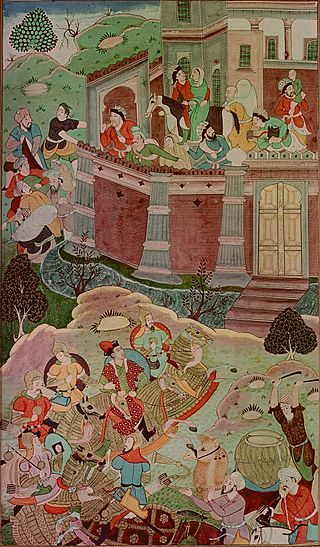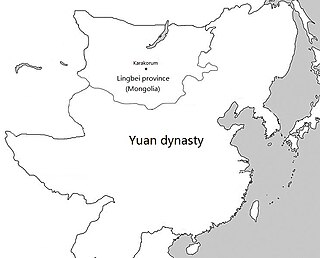
Möngke Khan was the fourth khagan of the Mongol Empire, ruling from 1 July 1251, to 11 August 1259. He was the first Khagan from the Toluid line, and made significant reforms to improve the administration of the Empire during his reign. Under Möngke, the Mongols conquered Iraq and Syria as well as the kingdom of Dali.

The Chagatai Khanate, also known as the Chagatai Ulus, was a Mongol and later Turkicized khanate that comprised the lands ruled by Chagatai Khan, second son of Genghis Khan, and his descendants and successors. At its height in the late 13th century the khanate extended from the Amu Darya south of the Aral Sea to the Altai Mountains in the border of modern-day Mongolia and China, roughly corresponding to the area once ruled by the Qara Khitai.

Ariq Böke, the components of his name also spelled Arigh, Arik and Bukha, Buka, was the seventh and youngest son of Tolui and a grandson of Genghis Khan. After the death of his brother the Great Khan Möngke, Ariq Böke claimed the title of the Great Khan of the Mongol Empire and briefly took power while his brothers Kublai and Hulagu were absent from the Mongolian Plateau. When Kublai returned for an election in 1260, rival factions could not agree, and elected both claimants, Kublai and Ariq Böke, to the throne, resulting in the Toluid Civil War that fragmented the Mongol Empire. Ariq Böke was supported by the traditionalists of the Mongol Empire, while his brother Kublai was supported by the senior princes of North China and Manchuria.

Kaidu was a grandson of the Mongol khagan Ögedei (1185–1241) and thus leader of the House of Ögedei and the de facto khan of the Chagatai Khanate, a division of the Mongol Empire. He ruled parts of modern-day Xinjiang and Central Asia during the 13th century, and actively opposed his uncle, Kublai, who established the Yuan dynasty. Medieval chroniclers often mistranslated Kadan as Kaidu, mistakenly placing Kaidu at the Battle of Legnica. Kadan was the brother of Güyük, and Kaidu's uncle.

Berke Khan was a grandson of Genghis Khan from his son Jochi and a Mongol military commander and ruler of the Golden Horde, a division of the Mongol Empire, who effectively consolidated the power of the Blue Horde and White Horde from 1257 to 1266. He succeeded his brother Batu Khan of the Blue Horde (West), and was responsible for the first official establishment of Islam in a khanate of the Mongol Empire. Following the Sack of Baghdad by Hulagu Khan, his cousin and head of the Mongol Ilkhanate based in Persia, he allied with the Egyptian Mamluks against Hulagu. Berke also supported Ariq Böke against Kublai in the Toluid Civil War, but did not intervene militarily in the war because he was occupied in his own war against Hulagu and the Ilkhanate.
Qara Hülegü was head of the ulus of the Chagatai Khanate.
Yesü Möngke was head of the ulus of the Chagatai Khanate.
Mubarak Shah was Khan of the Chagatai Khanate he was the son and successor of Qara Hülegü.

Alghu was the khan of the Chagatai Khanate (1260–1265/6). He was the son of Baidar and the grandson of Chagatai Khan.

The Berke–Hulagu war was fought between two Mongol leaders, Berke Khan of the Golden Horde and Hulagu Khan of the Ilkhanate. It was fought mostly in the Caucasus Mountains area in the 1260s after the destruction of Baghdad in 1258. The war overlaps with the Toluid Civil War in the Mongol Empire between two members of the Tolui family line, Kublai Khan and Ariq Böke, who both claimed the title of Great Khan (Khagan). Kublai allied with Hulagu, while Ariq Böke sided with Berke. Hulagu headed to Mongolia for the election of a new Khagan to succeed Möngke Khan, but the loss of the Battle of Ain Jalut to the Mamluks forced him to withdraw back to the Middle East. The Mamluk victory emboldened Berke to invade the Ilkhanate. The Berke–Hulagu war and the Toluid Civil War as well as the subsequent Kaidu–Kublai war marked a key moment in the fragmentation of the Mongol empire after the death of Möngke, the fourth Khan of the Mongol Empire.
Descent from Genghis Khan in East Asia is well documented by Chinese sources. His descent in West Asia and Europe was documented through the 14th century, in texts written by Rashid-al-Din Hamadani and other Muslim historians. With the advent of genealogical DNA testing, a larger and broader circle of people have begun to claim descent from Genghis Khan owing to dubious and imprecise haplogroup identifications. However, while many of Genghis Khan's agnates' resting places are known, none of their remains have been tested to prove or disprove these theories and debate continues.
Büri was a son of Mutukan and a grandson of Chagatai Khan.

Kublai Khan, also known by his temple name as the Emperor Shizu of Yuan and his regnal name Setsen Khan, was the founder and first emperor of the Mongol-led Yuan dynasty of China. He proclaimed the dynastic name "Great Yuan" in 1271, and ruled Yuan China until his death in 1294.
Ebuskun served as regent for the Chagatai Khanate from 1242 until 1246 during the minority of her son Qara Hülëgü.
Yesünto'a was the third son of Mutukan, and grandson of Chagatai, founder of the Chagatai Khanate. His brothers were Yesü Möngke and Baidar. His nephew Alghu son of Baidar and his brother Yesu Mongke, both were the Khans of the Chagatai Khanate, as were Yesünto'a's sons Qara Hülëgü and Baraq (1266–1271).
Checheyigen was the second daughter of Genghis Khan, the founder of the Mongol Empire, and his first wife Börte. As part of Genghis's policy of marrying his daughters to powerful rulers in exchange for their submission, she married a prince of the Oirat tribe, who lived near Lake Baikal, in 1207. There, she assumed a high-ranking administrative role among her husband's people, organising people and flocks like other high-ranking nomadic women. Over the following decades, Checheyigen arranged a series of advantageous marriages for her seven children and, after she backed the successful side in the Toluid Revolution of the early 1250s, her Oirat family became one of the most powerful in the empire. However, her descendants failed to take full advantage of their position, and eventually lost most of their influence.
The Toluid Civil War was a war of succession fought between Kublai Khan and his younger brother, Ariq Böke, from 1260 to 1264. Möngke Khan died in 1259 with no declared successor, precipitating infighting between members of the Tolui family line for the title of Great Khan that escalated to a civil war. The Toluid Civil War, and the wars that followed it, such as the Berke–Hulagu war and the Kaidu–Kublai war, weakened the authority of the Great Khan over the Mongol Empire and split the empire into autonomous khanates.
The division of the Mongol Empire began after Möngke Khan died in 1259 in the siege of Diaoyu Castle with no declared successor, precipitating infighting between members of the Tolui family line for the title of khagan that escalated into the Toluid Civil War. This civil war, along with the Berke–Hulagu war and the subsequent Kaidu–Kublai war, greatly weakened the authority of the great khan over the entirety of the Mongol Empire, and the empire fractured into four khanates: the Golden Horde in Eastern Europe, the Chagatai Khanate in Central Asia, the Ilkhanate in Iran, and the Yuan dynasty in China based in modern-day Beijing – although the Yuan emperors held the nominal title of khagan of the empire.

The Yuan dynasty ruled over the Mongolian Plateau, including both Inner and Outer Mongolia as well as part of southern Siberia, between 1271 and 1368. The Mongolian Plateau is where the ruling Mongol Borjigin clan of the Yuan dynasty came from, thus it enjoyed a somewhat special status during the Yuan dynasty, although the capital of the dynasty had been moved from Karakorum to Khanbaliq since the beginning of Kublai Khan's reign, and Mongolia had been converted into a regular province, known as the Lingbei Province, by the early 14th century.